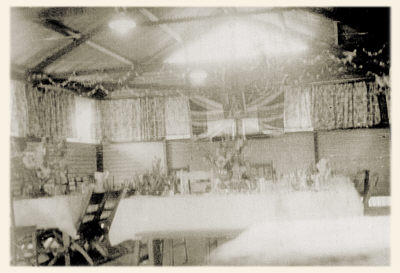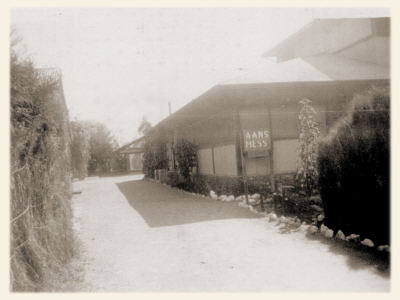LILA MARY DAVIES (nee ROWLEY)
MOTHER:
ANNIE ROWLEY ( nee CAIN)
FATHER :
ROBERT ROWLEY
BORN: At
Dromana ,Victoria 31.05.1920, resident of Rye on the Mornington Peninsula.
SIBLINGS:
ALMA.. .1918
ROBERT
(BOB)...1924
DESMOND 1930
I was born
into the post world war depression and Rye was a very small seaside village then
with very few facilities. No electricity- no piped water (tanks or wells only)
no sewerage, of course, and very few telephones. No doctor, no policeman and as
far as I knew no church. However there was a school which had been there since
1875.
I started my
schooling in the third replacement school The Rye State School No 1667, when I
was about 5+. I don�t remember much about the first year or so but I do
remember the arrival of our new headmaster Mr Lionel Martin in 1927.
The
schoolroom was one room, with grades pre-school to grade 8, so I spent 9 years
there. The pupil numbers were in the 30�s most of the time until a Catholic
school was built in Sorrento which took all the pupils from the whitecliff area,
most of whom were my relatives, so numbers diminished dramatically then.
Every Monday
morning we would be lined up at the flag pole with flag un-furled and recite
this credo;
I love God and my country;
I salute the flag
I honor the King
And cheerfully obey my parents, teachers and the law.
Imagine
schools getting away with that these days! Also, every morning we would be lined
up, hands held in front, fingernails upper for inspection, and anyone with dirty
nails would be in trouble.
When I was
about 7 and my sister Alma 8+, we lived on a small dairy farm and had to walk 3
miles to school through the paddocks or even further via the sand tracks. I
think that only lasted about 2 years when we moved back to the �town�.
Although
still in the grip of post WWI depression it was not so severe for country people
who could trap a rabbit, catch a fish and grow vegetables, everyone had
somewhere to live no matter how meager the dwelling. Although my parents were
very poor we always had a small house to live in. There were lots of
�swaggies� wandering the road looking for work or a hand-out that they
couldn�t get in the city (Melbourne). Since almost everyone was in the same
boat there was a lot of tolerance among the people, even the school kids
didn�t tease the kids who seemed to be the most poverty stricken but envied
the very few who might have a shilling to spend.
Even though
we always had a house to live in, the one on the farm was only a one room shed
and very basic, water had to be bucketed from a well at the bottom of a rise. I
don�t remember the small house behind the general store opposite the dry end
of the jetty where we lived for a time after I was born. When my father had a
little weatherboard house built in Wier Street it had a tank with a tap through
to the kitchen but no laundry or bathroom in fact, our houses didn�t have
those facilities until I left home at about 16, by which time there were four
children. I�m not sure where we all fitted, but my sister and I shared a bed
until she left to work in Melbourne.
When we
moved to Wier Street my father began a butchery business which consisted of a
galvanised shed where the meat was cut up and which had a large ice-chest. The
ice, like the meat, came from Wilson�s butchery in Sorrento about 8 miles
away, and my father carted it around in an old
T-model Ford, and many a curse he put on old Henry when he couldn�t get
it started.
After a time
we moved into a shop and dwelling on the highway. The house had four rooms but
still no bathroom or laundry; but to have a shop to work in must have been a
great help to my parents. So now my mother became a butcher instead of a
dairy-maid as she was on the farm, she served in the shop while my father did
deliveries as far as Portsea. By then the meat came from Angliss� in Melbourne
where my father worked before marriage, also, by then there was a more modern
butcher�s van. My mother became a first class butcher, she could split a sheep
down as well as any man (and she only 5ft2) and could cut a loin of lamb into
chops with a cleaver with such precision it seemed like an art form.
I am still a
child at this stage and didn�t realize how tough things were for my parents.
As a child I had no complaints, children didn�t have to be entertained.. .we
made our own fun. I spent a lot of time with my brother Bob on the beach or up a
tree or even setting a rabbit trap or two which we were forbidden to do. Toys
were out of the question� there were so few. Bob had a cap gun while my sister
and I had a celluloid doll each.
|
When I
became a teenager I was able to go to the local country dances in the
Mechanics Institute, a building only about twice the size of the school
(by this time the town had electricity). We young people would decorate
the hall with red gumtree tips, lush green creepers and coloured
crepe-paper strips, then we would polish up the floor with sawdust and
grated candle wax and drag around hessian bags with weights on them.
Supper was always served with home-made fare and tea (no coffee), and the
dance always ended at midnight because it was always on a Saturday. Sunday
was sacrosanct. Some families didn�t even allow knitting on a Sunday.
That didn�t happen in our house, of course, there was always too much
work to be done.
|
 |
We each had
a few allotted tasks and one of mine was to feed the free-range hens and track
any wayward chook that decided to lay her eggs in the bushes that surrounded our
place, in the hopes it wouldn�t be found. But I was a smart tracker and learnt
to think like a chook! My other chore was to cut up newspaper into squares,
thread them onto string and hang them on a nail in the toilet (dunny).
I had a
closer relationship with my Rowley relations than with the Cain side because the
Rowleys were only a couple of paddocks away and I passed my grandparent�s
house on my way to school every day.
I have only
a hazy recollection of my grandmother who died when I was about 4 and my
grandfather died before I was born. There always seemed to be an over-abundance
of aunts and uncles in the old house and I regret that they didn�t encourage
kids to ask questions. I asked the questions but didn�t get the answers. It
was a big old house and I spent a lot of time there. The kitchen was the heart
of the place. A large room with a big open fire, a hard horsehair couch which
always seemed to have an occupant for reasons unknown to me ... often it was a
�headache�, which mystified me because I couldn�t see anything on the
victim�s head and wouldn�t dare ask.
They were
kindly folks, my relatives, but were stern with children, and since the women
all had mops of hair piled on their heads and the men had flourishing moustaches
they presented a rather intimidating sight to small kids.
I loved
being at that old house because it was really on a small farm property. It had a
cow, a milking shed and a crop of something I think was sweet-corn, and opposite
the kitchen was a large spreading pepper tree under which was a dairy with a
separator for the milk. Sometimes I was allowed to turn the handle and loved the
singing sound it made. There seemed to be sheds everywhere. The milking shed,
the laundry shed, where my aunts made their own soap, the hay shed and loft
where their chooks went to lay and a shed for the broad-wheel dray and jinker
(their mode of transport) and the horse.
I left
school before I turned 14 and didn�t go to Frankston High because we
couldn�t afford the expenses. I stayed at home and helped to look after my
young brother Des. Later I took a position as a housemaid in a house in Elwood.
This soon palled and I went home. The great thing was � there was always HOME
to go to, so one never felt abandoned.
While
working in Elwood where my sister worked next door, we would go into the city
together and also to Luna Park. We mostly looked but didn�t buy because our
wage was 10 shillings. However, one day I bought a ticket in a raffle for the
Children�s hospital, for sixpence. I had to give a title to a picture on the
ticket and send it in for judging � and, bless my soul, I won it. The prize
was a Shetland pony and small gig or 50 pounds. Guess which one I took? This
money launched me on my career.
SO; I now
have the means to take the first step on the road to my future. A holidaying
family, who rented a house near us had dealings with the Fairfield Infectious
Diseases Hospital, and suggested that if I wanted a live-in job I should apply
for a position as a nurses� aid. Now I could afford to attend a dentist in
Frankston instead of the one who visited Rosebud and saw his clients in the
kitchen behind the milk bar while they sat on a kitchen chair! I also had money
for uniforms.
I had an
interview with the Matron, also a medical examination, and was taken aboard,
even though I was less than 17.
As it
happened, there was a diphtheria epidemic as well as a polio epidemic, so the
work was hard and the hours long but I had found my niche. Treatment was
primitive by today�s standards and there was no immunization so the diseases
spread rapidly. How fortunate we are today to be able to protect our children
from such horror diseases.
It was
terrible to see little children needing a tracheotomy (a metal tube inserted
into their trachea through a hole in the neck) to help them to breathe because
their windpipes were blocked by diphtheria membrane. Parents were not allowed to
visit these little children, nor the polio victims, for fear of spreading the
diseases further. I dread to think what effect this had on the children in the
long term.
Many of the
trained staff told me I should do my general training because I was a willing
and able nurse but, of course, I didn�t have the necessary educational
standard (Leaving).
| However, through some contacts I had, I got an
interview with the Matron of the Alfred Hospital in Prahran after I
finished my year at Fairfield. I was accepted into the three month
preliminary training school but warned not to be too hopeful because all
the other girls were �educated� and I would be left behind . As it
happened I was way ahead of them because I already knew how to empty
bedpans without being sick, clean up dirty beds, take temperatures and
make patients comfortable. |
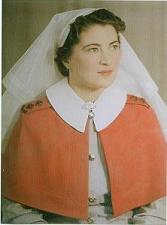 |
Whilst at
the Alfred I worked with senior nurse Shirley Davies who took pity on this naive
country girl and took me to their place some Sunday nights for tea. There I met
brothers Jack and Robert (Bob) who was itching to join up but his mother, a
widow with four children, wouldn�t sign the necessary form so he put his age
up and signed the form himself.
After 3
years at the Alfred I became a trained nurse. By this time World War Two had
begun and I was fired with enthusiasm to join the Army Nursing Service but, once
again, I was too young at 22. I needed to be 25. My hounding paid dividends when
the war escalated and Australia was threatened and I joined when I was 23.
Looking back, I�m sure I was too young but like most young people I thought I
was 10 feet tall and bullet proof!!.
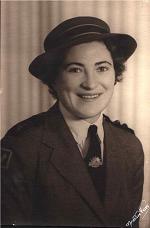 |
I did
6 months at Heidelberg Military Hospital before being eligible to join the
AIF, which meant I was prepared to serve overseas with the rank of
Lieutenant. I was at Heidelberg when the hospital ship Centaur was
torpedoed by a Japanese submarine off the Queensland coast in May 1943.
The shock waves fairly shook the walls. The sadness and horror was
palpable; so many of the staff had lost a friend ,a colleague and some, a
relative.
|
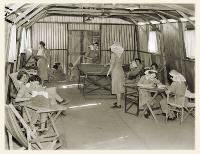 |
I was posted to 109
A.G.H at Alice Springs, which was a very different experience because
we nursed not only service personnel but Aboriginals as well. I travelled
to Alice on a train called The Ghan, short for Afghan because the original
train was hauled by camels in charge of an Afghan and took weeks to make
the journey. My train was a steam train and did the trip in 4 days and 3
nights, and that was boredom personified. Later in my life when I was a
retiree I did the same trip with Bob, in the modern Ghan in the lap of
luxury, an overnight trip with sleeping berth with bathroom and a 4 star
restaurant and bar! So much for progress! |
|
| From Alice Springs I was posted to Aitape
in northern New Guinea. This entailed returning to Melbourne, a troop
train to Sydney and then boarding the hospital ship Wanganella
for Aitape via Lae. We were now aware that the illuminated red crosses
that these ships carried which was supposed to protect them, actually made
them prime targets for the Japanese as the Centaur
proved to be. |
 |
I can�t
remember being afraid because I was with my colleagues and we were all in the
same boat -- so to speak!
After about
7 months at Aitape the atom bombs were dropped and Japan surrendered, but the
Japanese soldiers would not believe such a thing was possible, so they fought
on. While in Aitape I was visited by Bob Davies and it was nice to see someone
from home. I also had three cousins from Rye in the area but saw little of them
-- they were fighting and I was nursing!
I was then
sent to Rabaul, which was now freed from the Japanese. We cared for the troops
and the prisoners of the Japanese who were in a deplorable state of health and
waiting to be repatriated to the mainland. Because all available transport was
used for this purpose the hospital remained to care for the less urgent cases
for another three months or so.
 |
Rabaul was a rather awesome place,
surrounded as it was by volcanoes, some smoking and steaming all day and
always an overpowering smell of sulphur. |
My journey
from Aitape to Rabaul was punctuated by a period of duty for some weeks at a
Casualty Clearing Station in Wewak, also on the New Guinea coast.
Both Aitape
and Rabaul having survived the destruction of the war years, eventually rebuilt
their communities . However, it is rather ironic that they have both since been
completely destroyed by the forces of nature. Aitape, by a huge tidal wave
(tsunami) in 1998 and soon after Rabaul was destroyed by a massive volcanic
eruption rendering both places unfit for human habitation. Also, in more recent
times, (September 2002) Wewak suffered severe damage from a 7.5 R/s earthquake.
I doubt that any of these places would welcome me back to see their relocated
communities !!
I returned
to Heidelberg Hospital in 1946 to find I was a victim of malaria and
intestinal parasites. The malaria was kept at bay with medication while in
the islands, but when the suppressants were discontinued after reaching home,
the disease took over, so I spent some time as a patient before being discharged
from the AIF in September 1947 � 5 years to the month since I joined in 1942.
During that
time I still visited the Davies family because Shirley too, was home from her
service in the army and they now lived in Heidelberg so Bob and I met up again
and gravitated together because of our shared experiences, this led to us
becoming engaged just before Bob went to Mildura to do first year medicine.
During that time I did a dressmaking course so I could make my wedding gown and
attendant�s dresses.
Bob and I
married in 1949 and had a house built in Rosanna , then a very outer suburb of
Melbourne. Bob spent 6 years studying and I spent 6 years being quiet at night,
growing vegetables and keeping chooks during the day so we could survive on the
Rehabilitation Allowance, without which, I might add, none of this would have
happened.
After Bob
graduated and spent a year in a general practice for the experience, we bought a
solo practice in Tongala , Northern Victoria. That was 10 years of hard work and
disturbed nights but very rewarding. When in the workforce I thoroughly disliked
night duty but now I was introduced to plenty of night duty with no-one to take
over the day shift which included an active role in the practice.
| Our son, Peter was then 5 months old, a cute and
energetic little boy. Graeme arrived 2 years later, then our third son,
Ian, arrived 3 years 8 months later, so with 3 boys , the eldest still 6 ,
plus being an integral part of the practice, I had a busy 10 years. I was
happy that the boys began their lives in the country, it is a refreshing
and healthy start to life. |
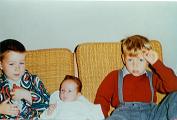 |
After 10
years it was apparent that changes would have to be made. We would need better
schools for the boys and boarding school would never have been an option , also
Bob was beginning to feel the strain of providing a 24 hour service 7 days a
week. It was time to leave our patients and many friends.
